As we journey through the realm of education, one inevitable aspect emerges - the art of facing examinations. These assessments, woven into the fabric of our educational system, hold the potential to unlock doors to countless opportunities. The stage is set, the spotlight shines upon you, as you find yourself up against a formidable challenge.
Within the vast ocean of academic examinations lies a diverse array of concepts, techniques, and strategies. It is in this arena that individuals must showcase their knowledge, understanding, and aptitude. Eager minds unite to unravel the mysteries of achieving academic success, forging their path towards a promising future.
Embracing the pursuit of excellence, students find solace in the guidance offered by seasoned mentors. They seek to equip themselves with the tools necessary to navigate the intricate labyrinth of examinations. This article endeavors to illuminate the pathway towards success, unveiling the secrets that lie in mastering the art of exam preparation.
Tried and Tested Strategies for Successful Exam Preparation
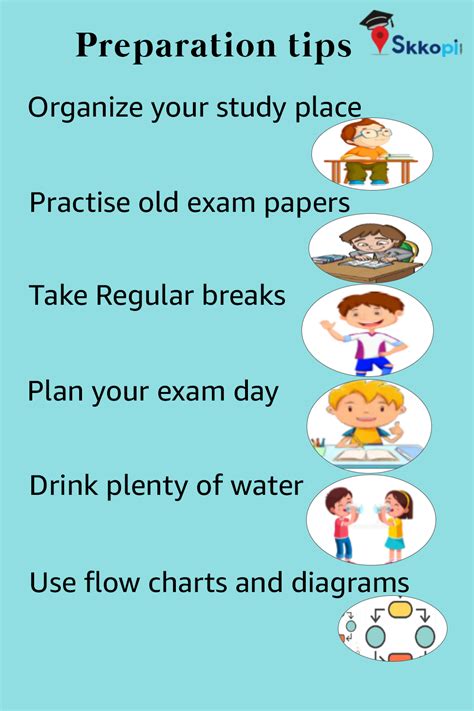
Efficiently preparing for an upcoming exam requires a combination of smart planning, effective organization, and focused dedication. In this section, we will explore various techniques and tips that can help you optimize your study process and maximize your chances of exam success.
- Create a comprehensive study plan: Establishing a structured study schedule is crucial for efficient exam preparation. Break down your syllabus into manageable sections and allocate specific time slots for each topic. This will help ensure that you cover all the necessary material before the exam date.
- Utilize active learning methods: Passive reading and cramming information are often ineffective strategies. Engaging in active learning techniques such as summarizing material in your own words, teaching concepts to a study partner, or solving practice problems can enhance your understanding and retention of the subject matter.
- Practice with past exams and sample papers: Familiarize yourself with the format and types of questions commonly asked in previous exams. Work through past papers and sample questions to gain confidence and improve your time management skills. Analyzing your performance on these exercises can help you identify areas that require further attention.
- Break down complex topics: If you encounter challenging concepts or theories, try breaking them down into smaller, more manageable parts. Understand the underlying principles before moving on to more complex aspects. Utilize visual aids, diagrams, or mnemonic techniques to aid your comprehension.
- Take care of your well-being: Physical and mental well-being play a crucial role in your ability to concentrate and retain information. Get enough sleep, eat balanced meals, and take regular breaks during your study sessions. Engage in stress-relieving activities such as exercise or meditation to maintain a healthy mindset throughout the exam preparation period.
- Seek support and clarification: Don't hesitate to reach out to your instructors, classmates, or online communities if you have any doubts or need clarification on certain topics. Discussing and explaining concepts to others can solidify your own understanding and provide valuable insights.
By following these proven strategies, you can approach your exams with confidence and increase the likelihood of achieving your desired results. Remember, effective preparation is the key to success!
Create a Study Schedule
Developing a well-structured study schedule is an essential component in achieving academic success. By carefully planning and organizing your time, you can optimize your study sessions and effectively prepare for your upcoming examination. In this section, we will explore strategies and techniques to help you create a study schedule that works best for you.
1. Determine Your Priorities: Begin by identifying your priorities and understanding the importance of different subjects or topics. Consider the weightage assigned to each topic in the examination, as well as your own proficiency and comfort level with them. This will help you allocate adequate time to each subject accordingly.
2. Set Realistic Goals: Set specific and achievable goals for each study session. Break down your study material into smaller, manageable chunks, and assign a realistic time frame to cover each segment. Setting achievable goals will not only boost your motivation but also enhance your productivity.
3. Allocate Time Wisely: Determine the best time slots for studying based on your personal preferences and energy levels. Some individuals may find it more productive to study in the mornings, while others may prefer late evenings. Experiment with different time slots to identify when you are most alert and focused.
4. Establish a Routine: Consistency is key when it comes to effective studying. Establish a regular study routine by dedicating specific days and times to each subject. This will help you develop a habit, making it easier to stick to your study schedule in the long run.
5. Take Breaks: It is important to incorporate breaks into your study schedule. Working for long periods without a break can lead to fatigue and decreased productivity. Plan short breaks between study sessions to relax, rejuvenate, and maintain your focus.
6. Utilize Productive Study Techniques: Incorporate various study techniques that suit your learning style and help you retain information effectively. Experiment with techniques such as active recall, spaced repetition, and concept mapping to make your study sessions more engaging and fruitful.
7. Stay Flexible: While having a study schedule is important, it is equally important to be flexible. Life can be unpredictable, and unforeseen circumstances may arise. Be prepared to adjust your schedule when necessary, while still maintaining a sense of discipline and commitment to your studies.
By following these guidelines and tailoring them to your specific needs, you can create a study schedule that maximizes your potential and paves the way for examination success.
Master the Material: Effective Strategies to Comprehend and Retain Information
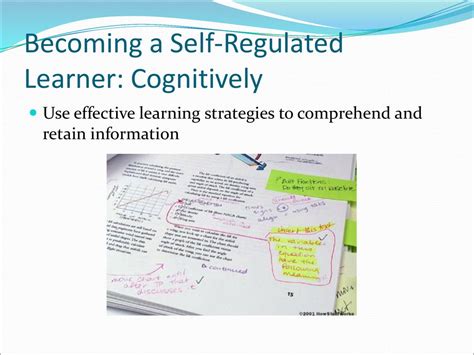
In this section, we will explore various techniques and approaches to breakdown the study material efficiently, enabling you to better understand and remember the content without feeling overwhelmed. By employing these strategies, you'll enhance your ability to grasp complex concepts, improve your overall comprehension, and increase your chances of success in examinations.
Analyze and Organize: Begin by carefully analyzing the study material and identifying its key components. Break down the content into smaller, manageable sections, and create a structured outline or mind map. This visual representation will help you see the relationships between different topics and subtopics, making it easier to absorb and remember the information.
Summarize and highlight: After breaking down the material, summarize each section in your own words. Try to condense the main ideas and important details into concise statements or bullet points. Additionally, use highlighting techniques to emphasize key concepts or passages. By actively engaging with the material through summarization and highlighting, you'll reinforce your understanding and create valuable study aids for revision.
Visualize and Mnemonics: Utilize visual aids such as diagrams, charts, and graphs to represent complex information visually. Visualizing concepts can enhance comprehension and memory recall. Furthermore, mnemonic devices, such as acronyms or mnemonic sentences, can help you remember lists, sequences, or specific facts. Explore different mnemonic techniques and find the ones that work best for you.
Teach and Discuss: One of the most effective ways to solidify your understanding of a topic is to teach it to others or engage in discussions with peers. Explaining concepts in your own words not only helps you identify any gaps in your knowledge but also reinforces your learning. Actively seek opportunities to share your knowledge, whether through study groups, online forums, or tutoring, as it will enhance your overall comprehension and retention.
Practice and Apply: Actively engage with the material by practicing with relevant exercises, sample questions, or problem-solving scenarios. Applying your knowledge in practical contexts helps reinforce understanding and identify areas that require further clarification. Additionally, regularly reviewing and revisiting past topics will strengthen your knowledge base and ensure long-term retention.
Manage Time and Breaks: Break down your study sessions into manageable chunks, setting specific goals for each session. By implementing regular breaks, you can prevent mental fatigue and maintain focus. It is essential to create a study schedule that includes dedicated time for breaks, allowing your brain to rest and recharge. Proper time management will lead to more effective study sessions and an improved ability to retain information.
Embrace Multisensory Techniques: Engage multiple senses during your study sessions to enhance learning. For example, read aloud to incorporate auditory stimulation, or use flashcards to incorporate tactile engagement. By involving different senses, you activate various neural pathways, making it easier to absorb and recall information.
Review and Reflect: Regularly review and reflect on the material you have covered. Take the time to revisit your notes, summaries, and study aids. Reflect on the information, make connections between different topics, and relate the material to real-life scenarios whenever possible. The act of regular review and reflection reinforces your understanding, improves retention, and allows for a deeper level of comprehension.
By employing these strategies to break down the study material, you can effectively comprehend, retain, and ultimately succeed in your examinations. Remember that each individual's learning style and preferences may differ, so feel free to adapt and customize these techniques to suit your unique needs.
Effective Learning Strategies to Enhance Your Exam Performance
Developing diverse learning techniques can significantly boost your chances of achieving success in examinations. By incorporating a variety of strategies, you can actively engage with the material, maximize retention, and ultimately improve your performance.
One effective method is visual learning, which involves using images, diagrams, and charts to represent information. This approach stimulates the brain's visual processing capabilities and aids in the formation of connections between concepts, making it easier to recall during exams. Additionally, utilizing mnemonic devices such as acronyms or visualization techniques can further enhance memorization.
Another powerful strategy is active learning, which involves actively participating in the learning process rather than passively absorbing information. This can be achieved through techniques like group discussions, where you can collaborate with classmates to exchange ideas and reinforce your understanding of the subject matter. Additionally, practicing active recall by regularly testing yourself on the material can solidify your knowledge and improve your ability to recall information under exam conditions.
Furthermore, incorporating auditory learning methods can help reinforce the material. By listening to lectures, podcasts, or recorded explanations, you can engage your auditory senses and reinforce your understanding of the topics. Explaining the concepts out loud or recording voice notes can also be an effective way to consolidate your understanding and aid in retention.
Lastly, embracing kinesthetic learning techniques can further enhance your exam preparation. This approach involves incorporating physical movement into your study routine. For example, you can utilize flashcards and physically move them around to reinforce your learning. Engaging in hands-on activities, such as conducting experiments or interactive simulations, can also deepen your understanding of abstract concepts and make the learning experience more enjoyable.
By incorporating a combination of visual, active, auditory, and kinesthetic learning strategies, you can create a well-rounded study plan that maximizes your learning potential. Remember, everyone has unique preferences and learning styles, so don't be afraid to experiment and find the techniques that work best for you. With dedication and adaptability, you can excel in your examinations and achieve your desired academic goals.
Improve your Exam Performance: Learn from Past Exam Papers
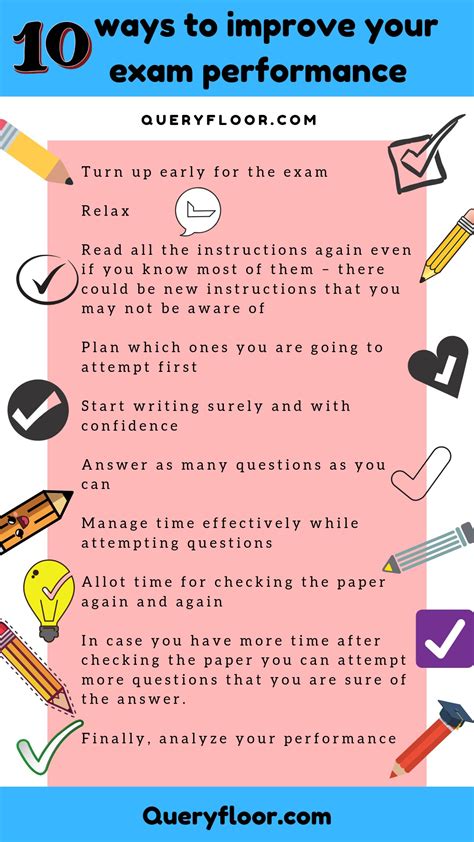
One effective strategy to enhance your performance in examinations is to practice with past exam papers. This technique allows you to familiarize yourself with the format and types of questions that may be asked in upcoming exams.
By reviewing previous exam papers, you can gain a deeper understanding of the topics that are commonly covered and identify any knowledge gaps you may have. This will help you prioritize your study materials and allocate your time more effectively.
Additionally, practicing with past exam papers enables you to develop an exam strategy. Through repeated exposure to similar questions, you can refine your problem-solving skills, improve your mental agility, and become more comfortable with time constraints.
- Enhances familiarity: Practicing with past exam papers enables you to become familiar with the structure and layout of the exam, reducing test anxiety and helping you to feel more confident on exam day.
- Identifies weak areas: Reviewing previous exams helps you identify areas where you may need additional study time, allowing you to target your efforts and improve your overall understanding of the subject.
- Builds exam strategy: By working through past exam papers, you can develop effective strategies for tackling different question types, such as time management techniques and prioritization methods.
- Improves problem-solving skills: Regular practice with past exams enhances your ability to analyze and solve problems, as you become accustomed to the types of questions typically asked in exams.
- Boosts confidence: The more you practice with past exam papers, the more confident you will feel about your ability to handle the challenges of upcoming exams.
Remember, practicing with past exam papers should be done in conjunction with other study methods, such as reviewing textbooks, attending lectures, and engaging in group discussions. By incorporating this technique into your study routine, you can significantly improve your preparation and increase your chances of success in examinations.
Connect with a Study Partner or Group
Enhance your study experience by finding a study buddy or joining a study group. Collaborating with others in your exam preparation can bring a fresh perspective, foster motivation, and help you better understand and retain information.
Studying with a partner or group offers numerous benefits that can contribute to your success. First and foremost, it provides a platform for exchanging ideas and insights, allowing you to gain new perspectives on the subject matter. By engaging in discussions and debating different viewpoints, you can broaden your understanding and uncover new ways to approach complex topics.
Additionally, studying with others can boost your motivation and accountability. When you have a study partner or group, you are more likely to stay committed to your study schedule and meet your goals. The shared sense of responsibility acts as a driving force, pushing you to remain disciplined and focused throughout your exam preparation.
Furthermore, working with others fosters a supportive and collaborative environment. It creates opportunities for peer teaching and learning, as each member can bring their strengths and expertise to the table. By explaining concepts to each other, discussing challenging topics, and offering constructive feedback, you can reinforce your own understanding while helping others improve their knowledge.
Remember, finding the right study buddy or group is crucial. Look for individuals who share your academic goals, have a similar work ethic, and are motivated to succeed. Together, you can create a dynamic and productive study environment that maximizes your learning potential.
In conclusion, don't underestimate the power of studying with a partner or group. This collaborative approach can enhance your exam preparation, improve your understanding of the subject matter, foster motivation, and provide support throughout your journey towards success.
Take Breaks and Prioritize Self-Care
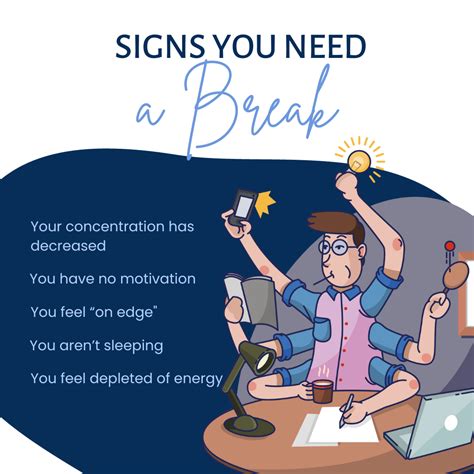
In the journey of preparing for an important examination, it is crucial to acknowledge the significance of taking breaks and practicing self-care. While dedicating oneself to the study routine, it is easy to become overly consumed by academic goals and lose sight of the importance of personal well-being. However, nurturing a healthy balance between preparation and self-care is essential for achieving success in examinations.
Stepping away from the books and giving yourself regular breaks not only rejuvenates the mind but also enhances productivity. Engage in activities that bring you joy and relaxation, such as going for a walk, practicing meditation, or indulging in hobbies. These breaks allow your brain to absorb the information more effectively and prevent burnout. Remember, self-care is not a luxury but a necessity to maintain focus and motivation.
During your breaks, ensure that you prioritize your well-being. Take care of your physical health by staying hydrated, eating nutritious meals, and getting enough sleep. Establishing a consistent sleep schedule and ensuring adequate rest will improve cognitive function and memory retention, making your study sessions more fruitful.
In addition to physical health, tending to your emotional well-being is equally important. Find ways to reduce stress and anxiety, such as practicing deep breathing exercises, journaling your thoughts and feelings, or seeking support from friends and loved ones. By acknowledging and addressing your emotional needs, you create a more conducive environment for effective learning and examination preparation.
Lastly, don't forget to reward yourself for your hard work and progress. Celebrate small milestones achieved during your preparation, whether it's completing a challenging chapter or achieving a specific goal. This positive reinforcement not only boosts self-confidence but also motivates you to continue striving for excellence.
In conclusion, taking breaks and prioritizing self-care are crucial aspects of examination preparation. By nurturing a balance between academic pursuits and personal well-being, you enable yourself to perform at your best and succeed in your examinations. Remember, a healthy mind and body pave the way for success!
Effective Strategies for Exam Success
In order to achieve success in your exams, it is essential to implement effective strategies that will maximize your performance and improve your chances of achieving your desired outcome. These strategies encompass a range of techniques and approaches designed to enhance your preparation and optimize your exam-taking abilities.
One important strategy is to develop a well-structured study plan that allows for effective time management and the allocation of adequate study time for each subject or topic. By organizing your study time efficiently, you can ensure that you cover all necessary material and avoid last-minute cramming. Prioritizing subjects based on their importance and difficulty level can also help you allocate your time in a more strategic manner.
Another crucial strategy is practicing active learning and engagement. Instead of passively reading through notes or textbooks, actively engage with the material by taking notes, summarizing key points, and asking yourself questions. This active approach enhances comprehension and retention, allowing you to recall information more effectively during exams.
Furthermore, it is essential to develop effective note-taking techniques. An organized, clear, and concise note-taking method can significantly aid your understanding of complex concepts and facilitate revision. Utilizing formats such as mind maps, diagrams, or bullet points can help visually organize information for easier recall during exams.
In addition, it is important to cultivate good time management skills during exams. Allocate a specific amount of time for each question or section, and stick to it. Be mindful of your pacing and avoid spending too much time on a single question. If you encounter a challenging question, move on to the next one and come back to it later if you have time remaining.
Lastly, don't neglect the importance of self-care during exam preparation. Prioritize sleep, exercise, and a healthy diet to ensure that you are in the best physical and mental condition for exams. Taking breaks and engaging in relaxation techniques, such as deep breathing or meditation, can also help reduce stress and improve focus.
By implementing these effective strategies, you can enhance your exam preparation and optimize your performance, increasing your chances of achieving success in your exams. Remember to find the strategies that work best for you and adapt them to your individual learning style and preferences.
| Benefits of Effective Exam Strategies |
|---|
| Improved time management |
| Enhanced comprehension |
| Increased information recall |
| Better organization of information |
| Reduced stress levels |
Mastering the Art of Reading and Comprehending Instructions
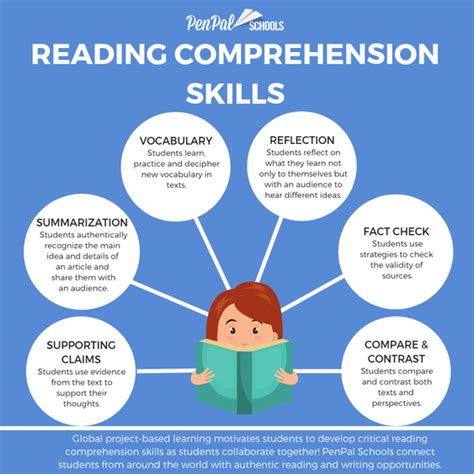
In order to excel in any examination, it is essential to possess the skill of effectively reading and understanding instructions. This crucial ability lays the foundation for a successful performance in the exam, allowing you to approach questions correctly and respond appropriately.
It is important to grasp the essence of the examiner's guidelines without any ambiguity. To achieve this, one must pay careful attention to the wording, structure, and context of the instructions provided. A genuine grasp of the instructions ensures clarity, prevents misunderstandings, and saves valuable time during the examination process.
An effective strategy to optimize your reading and comprehension skills is to familiarize yourself with diverse question types that are commonly encountered in the examination. This enables you to anticipate the instructions and tailor your approach accordingly. By developing a comprehensive understanding of potential question formats, you can enhance your ability to identify the main elements of instructions, differentiate between key concepts, and discern the most suitable techniques to apply.
Utilizing techniques such as highlighting keywords, underlining or circling vital information, and making simple notes can significantly aid in comprehension and retention of instructions. By actively engaging with the text, you create a mental framework that facilitates the absorption of valuable information. Additionally, organizing the instructions in a logical manner using bullet points, numbered lists, or mind maps can enhance understanding and provide a clear roadmap for your exam preparation.
- Ensure you carefully read and reread the instructions
- Pay attention to keywords and their synonyms
- Familiarize yourself with different question formats
- Employ active reading techniques to enhance comprehension
- Create a visual representation of the instructions using effective note-taking strategies
By incorporating these practices into your preparation routine, you can cultivate a solid foundation in reading and comprehending instructions. This not only boosts your chances of success in the examination but also equips you with a valuable skillset to excel in future academic and professional endeavors.
Prioritize and Allocate Your Time Effectively
Managing your time efficiently is crucial when it comes to preparing for and achieving success in examinations. It involves utilizing your available time wisely and giving priority to the tasks that matter the most.
Creating a well-structured schedule can help you stay organized and make the most of the time you have. Start by identifying the key topics and concepts you need to cover and arrange them in order of importance. This can help you allocate more time to the areas that require additional focus and revision.
Consider using a prioritization system, such as the Eisenhower Matrix, to categorize your tasks based on urgency and importance. This will help you determine which tasks should be addressed immediately and which can be postponed or delegated to others.
Breaking down larger tasks into smaller, more manageable ones can also contribute to effective time management. This not only makes the workload seem less overwhelming but also allows you to allocate specific time slots for each task, increasing your productivity and focus.
- Create a Schedule: Allocate specific time slots for studying different subjects or topics.
- Set Clear Goals: Establish specific and measurable goals for each study session or day.
- Prioritize Important Tasks: Identify the topics or concepts that need the most attention and allocate sufficient time to revise them.
- Use Time Blocks: Divide your study time into blocks, focusing on one subject or task during each block.
- Eliminate Distractions: Minimize interruptions and create a designated study environment free from distractions.
Effective time management not only helps you make progress in your exam preparation, but it also allows you to maintain a healthy work-life balance. By prioritizing your time and allocating it effectively, you can excel in your academic pursuits while still having time for relaxation and rejuvenation.
FAQ
How can I overcome exam anxiety?
Exam anxiety can be overcome by adopting various strategies such as practicing relaxation techniques, creating a study schedule, seeking support from friends or family, and maintaining a healthy lifestyle.
What are some effective study techniques?
Effective study techniques include breaking down the material into smaller chunks, using mnemonic devices to remember key information, practicing active recall through flashcards or quizzes, teaching the material to someone else, and taking regular breaks to optimize concentration.
Is it better to study alone or with a group?
Whether to study alone or with a group depends on personal preference and learning style. Some individuals find studying alone more productive and less distracting, while others benefit from group discussions and exchanging ideas. Experimenting with both methods can help determine the most effective approach.
How can I improve my time management skills during exams?
To improve time management during exams, it is important to prioritize tasks based on their importance and urgency, create a study schedule or timeline, avoid procrastination, and allocate sufficient time for breaks and relaxation. Time management apps or techniques such as the Pomodoro Technique can also be helpful.
What should I do if I don't understand a certain topic?
If you don't understand a certain topic, it is crucial to seek clarification immediately. You can approach your teacher or professor, ask classmates for assistance, utilize online resources such as educational websites or forums, or consider hiring a tutor. Don't hesitate to ask for help as understanding the subject matter thoroughly is essential for successful exam preparation.
How can I effectively prepare for an examination?
Preparing for an examination requires a systematic approach. Start by creating a study schedule that allocates specific time slots for each subject or topic. Break down the material into smaller, manageable units and use various learning techniques, such as summarizing, highlighting, making flashcards, and practicing with past papers. It is also important to take regular breaks during the study session to maintain focus and avoid burnout. Additionally, ensure you have a quiet and comfortable study environment, and stay well-rested and hydrated. Adopting a positive mindset and staying motivated will also contribute to your success in preparing for the examination.
What should I do on the day of the examination to maximize my chances of success?
On the day of the examination, it is crucial to start the day with a nutritious breakfast to fuel your brain. Arrive at the examination venue early to allow time for calming your nerves and familiarizing yourself with the surroundings. Before the examination begins, take a few moments to relax and engage in deep breathing exercises to reduce anxiety. During the examination, carefully read and understand all the instructions and questions. Plan your time effectively, allocating sufficient time to each section or question. If you encounter difficult questions, move on and revisit them later to avoid wasting time. Review your answers before submitting the examination and make sure to check for any mistakes or omissions. Remember to stay positive, trust in your preparation, and do your best!



